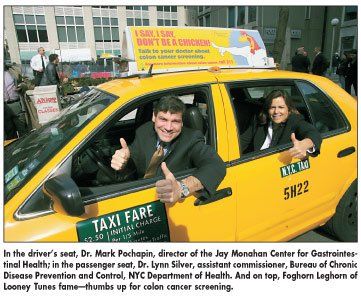'I Say, I Say, Don't Be a Chicken!' About Colon Cancer Screening: Taxi-Top Ads and PSA Videos
The Jay Monahan Center for Gastrointestinal Health at New York-Presbyterian Hospital/Weill Cornell Medical Center is teaming up with New York City's taxi drivers to remind New Yorkers and visitors to the city to get screened for colon cancer.
NEW YORKThe Jay Monahan Center for Gastrointestinal Health at New York-Presbyterian Hospital/Weill Cornell Medical Center is teaming up with New York City's taxi drivers to remind New Yorkers and visitors to the city to get screened for colon cancer. This unique and fun public outreach campaign will be featured in and on taxis throughout New York City, and is being conducted in collaboration with the NYC Taxi and Limousine Commission, the Metropolitan Taxicab Board of Trade, the NYC Department of Health and Mental Hygiene, and the city's 311 information line.
The campaign features taxi-top advertisements of the Warner Brothers cartoon character Foghorn Leghorn and in-taxi video PSAs with actor Jimmy Smits, both promoting colon cancer screening.

Foghorn Leghorn, voiced by Mel Blanc, was created in 1946 and thus should be well known to the generation old enough to be candidates for colon cancer screening. Foghorn may seem an odd choice, but this Southern gentleman rooster's blustering voice, which rings in the ears of the Baby Boomers, may be just the impetus needed for some people age 50 and over to schedule this important screening test.
[Editor's Note: This publication's 50-something executive editor recently had her first colonoscopy screening exam, in the interest of cancer prevention and to "set a good example." By the time I reached the outpatient surgical facility, I was feeling lightheaded from hunger and apologized to the nurse for not being entirely coherent as she asked questions and inserted an IV line into my dehydrated veins. "Almost no one drinks enough water," she commented. "I want a hamburger," I replied. I'll see her again in 10 years.]